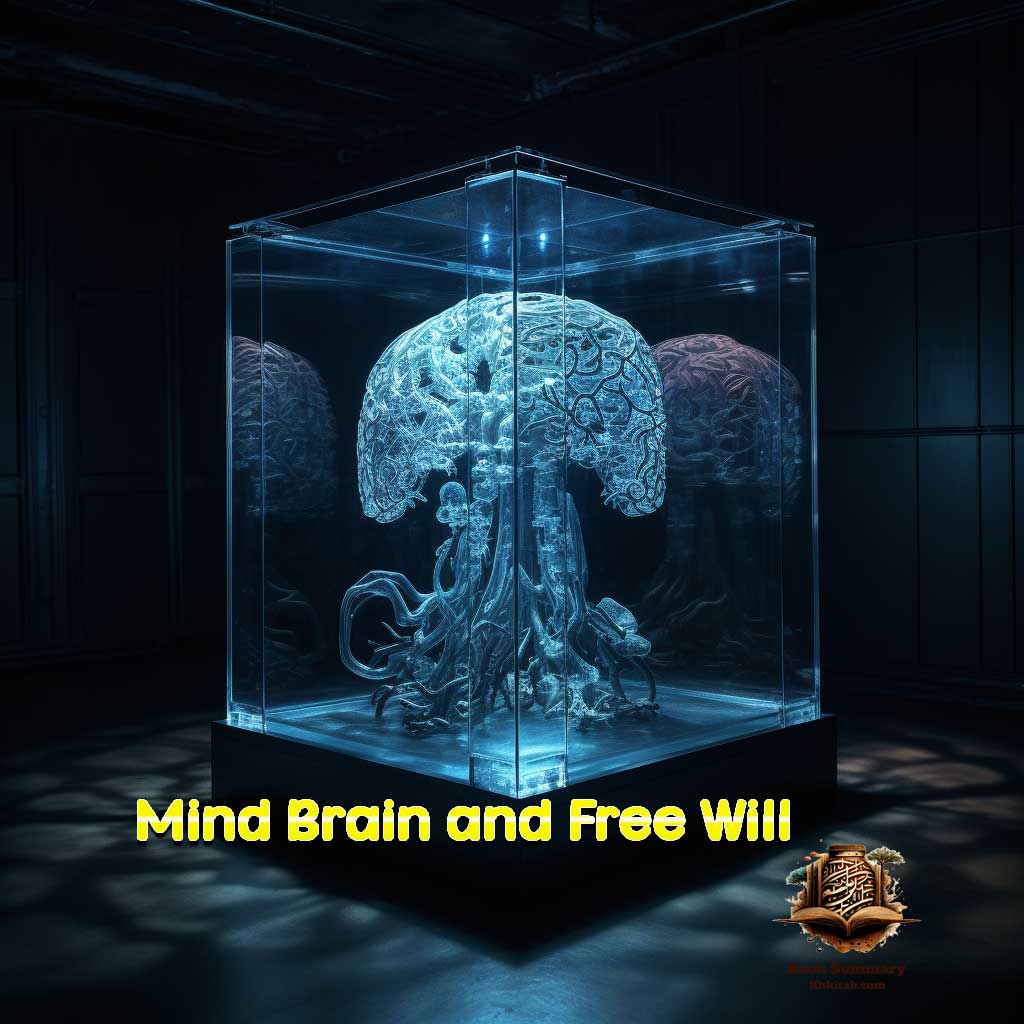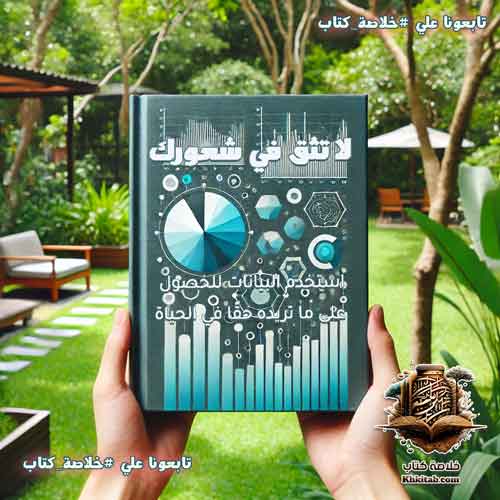Mind Brain and Free Will Book Summary

In the realm of philosophy and science, the intricate relationship between the mind, the brain, and free will remains one of the most debated and captivating subjects. as it’s known in English, “Mind Brain and Free Will” stands as a contemporary masterpiece delving into this profound issue. This work offers an expansive examination of the complex interplay between the conscious mind and the biological brain, and how true free will is realized amidst our human biological realities. While many scholars and philosophers strive for definitive answers, this book showcases how our current understanding can provide profound insights into these intricate matters, which lie at the very heart of human existence.
Table of Contents
Is the Mind Truly Distinct from the Brain? Delving into Dualism vs. Materialism with Mind Brain and Free Will’.
One of the most captivating discussions found in the groundbreaking work, “Mind Brain and Free Will”, is the debate on Dualism versus Materialism. This age-old philosophical conundrum has long intrigued scholars, neuroscientists, and thinkers alike.
Dualism posits that the mind and the brain are two distinct entities. It suggests that while our brains are physical and can be seen, touched, and studied, our minds – that is, our thoughts, feelings, and consciousness – operate on a different, non-material plane. This viewpoint implies that our consciousness or our ‘soul’ might exist beyond the physical confines of our brain.
On the other side of the spectrum, Materialism posits that our mind is simply a product of our brain’s processes. In this view, our thoughts, feelings, and even our self-awareness are results of electrical impulses and chemical reactions within our brains. There’s no separate realm where our consciousness exists; everything we think and feel can be traced back to a tangible, biological source.
“Mind Brain and Free Will” offers a comprehensive exploration of these views, shedding light on contemporary scientific findings that might support or challenge them. As neuroscience advances, we inch closer to deciphering the intricate dance between our neural circuits and the ethereal essence of thought and consciousness. Is it purely biology, or is there a separate, intangible essence that makes us truly ‘us’?
In a world where our understanding of the human psyche is continually evolving, the debate between Dualism and Materialism isn’t just academic; it touches the very core of how we perceive ourselves in the universe.
Does Neuroscience Challenge Our Belief in Free Will? Insights from “Mind Brain and Free Will”.
In the modern era, as neuroscience accelerates its exploration into the very fabric of our thoughts, a poignant question emerges: Does our understanding of the brain challenge the age-old concept of free will? “Mind Brain and Free Will” takes a deep dive into this complex territory. Free will, traditionally understood as our inherent ability to make choices uninfluenced by external forces or past events, stands at the heart of human identity. Yet, as neuroscience unravels the intricate pathways and determinants of decision-making processes within our brain, we are compelled to question if our actions are genuinely free or preordained by neurological factors. Determinism, the idea that every event, including human cognition and behavior, is causally determined by preceding events, further amplifies this dilemma. If our brain’s neural pathways have predetermined responses, can we genuinely claim autonomy over our decisions? “Mind, Brain, and Free Will” doesn’t just present these challenging questions; it guides readers through the labyrinth of arguments, evidence, and perspectives, offering invaluable insights into one of humanity’s most profound philosophical inquiries. In an age of advanced brain imaging and cognitive science breakthroughs, this exploration becomes ever more relevant, urging us to reconcile science’s findings with our deeply held beliefs about our own agency.
إقرأ أيضا:The Intelligence Trap: Mastering Smart Decisions in a Complex WorldOur Facebook Page – Book Summary
How Does “Mind Brain and Free Will” Navigate the Intricacies of Consciousness and the Notion of the Soul?
In our relentless quest to understand ourselves, the interplay between consciousness and the idea of the soul has remained a profound and often contentious subject. “Mind Brain and Free Will” by Richard Swinburne delves deep into this exploration, examining the fine line between the tangible and the ethereal. Is our consciousness merely a byproduct of the myriad neurological processes within our brain, or does it indicate the presence of a non-material soul that operates in harmony with our physical existence?
The belief in a soul, a non-material essence that defines our individuality and moral compass, has been a foundational element in numerous philosophical, religious, and cultural traditions. This soul, many argue, grants humans the capacity for free will, moral reasoning, and a deep sense of purpose. However, as modern neuroscience continues to make strides in mapping out the intricacies of the brain and understanding the mechanisms of consciousness, the question becomes ever more pressing: Can the concept of the soul still hold its ground?
“Mind Brain and Free Will” doesn’t merely pose questions; it ventures into the heart of the debate, juxtaposing ancient wisdom with contemporary scientific findings. The book grapples with the nature of free will in a world dominated by neuroscientific determinism and contemplates whether the soul can be reconciled with a universe governed by physical laws.
Ultimately, the journey Swinburne embarks upon in this groundbreaking work is not just academic—it speaks to the existential concerns of every individual seeking to understand their place in the vast tapestry of existence. As the boundaries between science and philosophy continue to blur, “Mind Brain and Free Will” stands as a testament to the enduring human spirit’s quest for understanding.
Philosophy and Sociology – Book Summary (khkitab.com)
Neuroscience and Decision Making: Do Recent Discoveries Redefine Our Understanding of Free Choices and Personal Agency?
The dynamic interplay between neuroscience and philosophy has long captured human imagination. In the context of Richard Swinburne’s “Mind Brain and Free Will” a central question emerges: How do recent neuroscientific advancements reshape our understanding of decision-making and the autonomy of individual choices?
Modern neuroscience, with its advanced imaging techniques, offers a window into the intricate dance of neurons and brain networks during decision-making processes. While some discoveries suggest that decisions might be initiated in the brain before we’re consciously aware of them, this revelation poses challenges to traditional notions of free will and personal agency.
In “Mind Brain and Free Will” Swinburne bravely delves into the neuroscience-philosophy intersection. He questions whether our conscious “I” is merely an observer in a predetermined neurological play, or if it genuinely plays a pivotal role in shaping choices. The nature of consciousness, its place in the decision-making process, and how it interacts with neural pathways remains central to his inquiry.
With a plethora of studies indicating that specific brain regions light up moments before an individual claims to have made a conscious decision, the debate becomes more intricate. Are these findings evidence against the existence of free will, or are they merely showcasing the preparatory processes of the brain?
Moreover, the understanding of “personal agency” itself is under the microscope. Swinburne prompts readers to reflect: If our choices are deeply rooted in neural activities, does this diminish our responsibility or merely redefine it in the light of scientific understanding?
In conclusion, “Mind Brain and Free Will” doesn’t provide easy answers. Instead, it beckons readers into a deeper contemplation of the mysteries of consciousness, decision-making, and personal agency in an era teeming with neuroscientific revelations. As Swinburne navigates this challenging terrain, he offers a compelling exploration, intertwining science and philosophy, pushing the boundaries of our understanding.
How does “Mind Brain and Free Will” shed light on our understanding of Moral Responsibility?
In Richard Swinburne’s deep-dive, “Mind Brain and Free Will” readers are invited to explore a central theme: the relationship between human free will and moral responsibility. With advances in neuroscience illuminating the intricate processes within our brains, traditional philosophical views of free will are being challenged like never before.
A pivotal question that Swinburne grapples with is this: If our decisions are largely influenced, or even pre-determined, by neural processes, can we still be held morally responsible for our actions? If every choice we make is a result of neural firing patterns or bio-chemical reactions, then the very foundation of morality, ethics, and law – all of which rely on the notion of free will – might seem undermined.
By delving into cognitive science findings alongside age-old philosophical arguments, “Mind Brain and Free Will” offers a nuanced perspective. Swinburne proposes that even in a world governed by neuroscience and determinism, there’s a space for free will – a kind of ‘meta-choice’ if you will, that influences our actions at a higher, perhaps spiritual, level.
The book, in essence, doesn’t provide definitive answers but rather stimulates reflection. It encourages readers to think critically about the interplay between free will, moral agency, and brain functionality. In a world where technology and science are rapidly evolving, the discussion becomes more pertinent. After all, understanding the mechanisms behind our choices could redefine our perception of morality and reshape societal norms.
For those intrigued by the crossroads of philosophy, ethics, and neuroscience, “Mind Brain and Free Will” is an essential read. It challenges, educates, and pushes the boundaries of what we believe about choice, responsibility, and the essence of our humanity.
Mental Causation in “v”: Can Our Thoughts Truly Influence Our Actions?
“Mental Causation” remains one of the most intriguing and debated topics in the realm of philosophy and neuroscience. Richard Swinburne’s “Mind Brain and Free Will” delves deeply into this subject, attempting to unravel the intricate relationship between our intangible thoughts and the tangible actions they purportedly precipitate.
At the heart of this discourse lies the concept of dualism, suggesting a bifurcation between the mind and the physical brain. If our minds are non-physical entities, how can they instigate physical changes in the world? Swinburne navigates this challenging terrain by dissecting various theories of causation, using both philosophical rationale and contemporary scientific findings.
The book spotlights a fundamental question: Are our actions mere products of brain activities, or are they genuinely influenced by our beliefs, desires, and intentions? This is not just a matter of academic curiosity; it bears significant implications for our understanding of moral responsibility, accountability, and the very essence of human agency.
With the advancements in neuroscience, researchers have mapped specific brain regions correlating to certain thoughts and emotions. However, Swinburne argues that mere correlations don’t necessarily translate to causation. Just because a neural pathway lights up when we think or feel doesn’t mean it’s the root cause of the subsequent action. There might be an overarching ‘mental’ cause guiding the process, a cause that transcends mere brain mechanics.
Drawing from both empirical evidence and metaphysical ponderings, “Mind Brain and Free Will” forces us to confront our preconceived notions about free will and determinism. It asks us to consider whether our thoughts, beliefs, and intentions, which often feel so profoundly personal and unique, can genuinely affect the external world.
For those embarking on a journey to understand the complexities of human decision-making and the role our mental states play in it, this book is a beacon. It doesn’t claim to have all the answers but certainly poses the right questions, pushing the boundaries of our understanding of the mind-brain conundrum.
In conclusion, Swinburne’s exploration of mental causation encourages a deeper introspection about our agency in the world. By juxtaposing philosophy with neuroscience, it brings forth a nuanced perspective on how our beliefs, intentions, and desires might indeed have a tangible impact on our actions and, by extension, the world around us.
Science vs. Philosophy in “Mind Brain and Free Will”: Where Do Empirical Findings and Philosophical Beliefs Intersect?
In the intricate realm of human cognition and consciousness, the eternal debate between science and philosophy reigns supreme. “Mind Brain and Free Will” by Richard Swinburne offers a deep dive into this conversation, probing the delicate boundaries and intersections between empirical neuroscientific findings and profound philosophical beliefs regarding the human mind.
At the heart of this dialogue lies the question: What constitutes the very essence of our thoughts, decisions, and consciousness? Science, with its empirical methodologies, seeks quantifiable patterns in brain activity, linking neural pathways to specific mental processes. Through MRI scans and brain-mapping technologies, scientists endeavor to chart the physical territories of abstract concepts like love, decision-making, and even the sense of self.
On the other hand, philosophy delves deeper into the qualitative aspect, asking why we think, how we differentiate right from wrong, and what free will truly means. Philosophical inquiries aren’t necessarily concerned with the ‘where’ but with the ‘why’. So, where do these two fields converge?
Swinburne’s work illuminates this intersection. He argues that while empirical science can highlight the mechanisms of the brain and its functionalities, it remains silent on the intrinsic meaning and purpose behind these processes. For instance, while neuroscience can pinpoint the brain regions activated during moral decision-making, philosophy questions the very nature of morality itself.
The balance between the two disciplines is delicate. Empirical science risks reductionism if it dismisses the nuanced complexities that philosophy brings to the table. Conversely, philosophy can appear detached from reality if it does not incorporate empirical findings to anchor its theories.
In a rapidly evolving technological age, where advancements in neurology provide deeper insights into the brain’s architecture, Swinburne calls for an integrative approach. By marrying empirical findings with philosophical perspectives, a more holistic understanding of the human mind can be attained.
In conclusion, “Mind Brain and Free Will” serves as a beacon for those traversing the intersections of science and philosophy. It doesn’t claim to have all the answers, but it poses crucial questions, urging us to bridge the gap between tangible empirical evidence and the intangible quests for meaning and purpose. Through Swinburne’s lens, we’re reminded that the dance between science and philosophy is not only essential but is the very essence of understanding the enigma that is the human mind.
Belief Systems and Free Will: How Do Different Traditions Interpret Human Agency?
Throughout history, various religious and philosophical traditions have grappled with the concept of free will. The question of whether individuals possess the capacity to act freely, without external influences or predetermined paths, has profound implications for ethics, moral accountability, and individual purpose. By delving into Richard Swinburne’s “Mind Brain and Free Will,” we can better understand these rich tapestries of thought and their impact on our contemporary perceptions.
- Christianity and Free Will: Christian theology often emphasizes the importance of free will in the context of moral responsibility. While the debate between predestination and free will persists, especially in the Calvinist tradition, many Christians believe that God granted humans free will to choose between good and evil, thereby determining their eternal destiny.
- Islamic Thought: Islamic philosophy, particularly in the Ash’arite and Mu’tazilite schools of thought, has engaged deeply with questions of free will versus predestination (Qadar). The consensus across various Islamic traditions underscores that while Allah knows all events before they happen, humans are granted free agency in their actions.
- Eastern Philosophies: In traditions like Buddhism, the concept of free will intertwines with ideas of karma and reincarnation. Actions in one’s current life, driven by intention and volition, impact future rebirths. Similarly, in Hinduism, the concept of Dharma, or duty, is central. While individuals might be influenced by their past karma, they have the agency to act according to their dharma.
- Secular Philosophies: Modern secular thought, influenced by existentialism, posits that humans are condemned to be free. Thinkers like Jean-Paul Sartre argue that we are radically free and thus bear full responsibility for our choices, in a universe devoid of predetermined meaning.
- Scientific Perspectives: Advances in neuroscience challenge traditional notions of free will, suggesting our decisions might be influenced by neurochemical processes. However, many argue that this doesn’t negate the philosophical or experiential reality of free agency.
Swinburne’s exploration in “Mind Brain and Free Will” serves as a bridge between these diverse perspectives. He suggests that while our understanding of the brain and its functions might evolve, the philosophical and spiritual quest to understand free will remains timeless. As science unveils the intricacies of the brain, it doesn’t necessarily solve or negate the profound philosophical questions about agency, morality, and purpose.
In conclusion, the notion of free will remains a central pillar across multiple belief systems and traditions. Its interpretation might differ, but its significance in shaping human understanding of purpose, morality, and self-agency is universally acknowledged.
The Future of Free Will: As Neuroscience and AI Progress, Where Does Our Understanding of Free Will Stand?
The concept of free will has been a subject of philosophical debate for centuries. The essence of the debate revolves around the question: Do individuals truly possess the autonomy to make independent decisions, or are our choices predetermined by internal or external factors? The book “Mind Brain and Free Will” by Richard Swinburne delves into this intricate topic, drawing connections between philosophical understandings and scientific insights. As we merge into an era dominated by advances in neuroscience and the rise of artificial intelligence (AI), our comprehension of free will becomes even more pertinent.
- Neuroscientific Insights: Modern neuroscience has started to unravel the complexities of the human brain, shedding light on how decisions are made. Some research suggests that our brain activity precedes the conscious decision, raising questions about the role of consciousness in decision-making. This poses a challenge: if our brain has already decided, where does free will fit in?
- Artificial Intelligence and Autonomy: AI advancements have spurred discussions about autonomy and decision-making in non-human entities. If a machine can “decide” or “learn” based on algorithms, can it be said to possess a semblance of free will? Moreover, as AI systems become more integrated into human decision-making processes, the lines between human autonomy and machine suggestions might blur.
- Philosophical Relevance: Regardless of scientific discoveries, the philosophical importance of free will remains. It’s tied to our understanding of morality, responsibility, and human purpose. Swinburne, in his book, argues that even with neuroscientific findings, there remains space for genuine free will and moral responsibility.
- Ethical Implications: As our understanding evolves, so too will the ethical implications. The merger of AI and neuroscience might require new frameworks for understanding responsibility, especially if decisions are made collaboratively between humans and machines.
- Interdisciplinary Dialogue: The future of free will will likely depend on a collaborative dialogue between philosophers, neuroscientists, and AI researchers. Each field provides unique insights, and a holistic understanding will emerge from their intersection.
In conclusion, the future of free will is at a fascinating crossroads. As we gain deeper insights from neuroscience and AI, our philosophical and ethical frameworks might need recalibration. Swinburne’s “Mind Brain and Free Will” serves as a reminder that no matter how advanced our knowledge becomes, the quest for understanding the true nature of human autonomy and decision-making will remain a central concern for humanity.
Mind Brain and Free Will Book Summary








